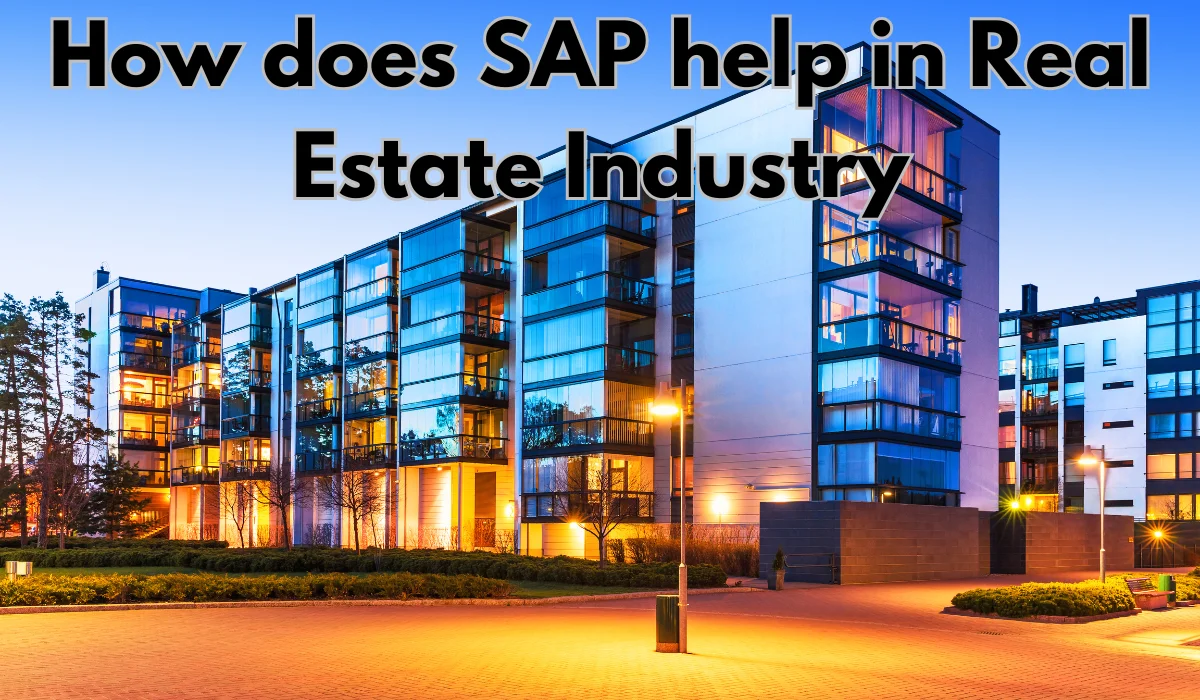
SAP provides a range of solutions tailored for the real estate industry that help streamline operations, enhance decision-making, and improve tenant and customer experience. Here are some of the main ways SAP supports the real estate industry:
1. Property and Lease Management
SAP Real Estate Management (RE-FX): SAP’s real estate module (RE-FX) is designed to handle all aspects of real estate, such as lease administration, property management, and space utilization. It enables automated lease processing, ensuring compliance with industry standards and reducing manual errors.
Lease Accounting Compliance: RE-FX also supports compliance with IFRS 16 and ASC 842 standards for lease accounting, making it easier to manage financial reporting and streamline audit processes.
2. Streamlined Asset Management
SAP helps companies manage the entire lifecycle of real estate assets, from acquisition and construction to maintenance and disposal. Using SAP Enterprise Asset Management (EAM), real estate firms can manage and schedule preventive maintenance, track asset conditions, and optimize asset usage.
3. Financial Management and Reporting
SAP provides comprehensive financial management solutions that support budgeting, cost control, and profitability analysis. It helps real estate companies manage finances efficiently with real-time insights into costs, revenues, and profitability for individual properties or entire portfolios.
SAP S/4HANA Finance: With this solution, organizations can benefit from centralized financial operations, advanced reporting, and analytics, making financial planning and analysis much easier for real estate portfolios.
4. Data-Driven Decision Making and Analytics
SAP’s analytics solutions, including SAP Analytics Cloud, provide real estate companies with valuable insights through data visualization, predictive analytics, and real-time reporting. This helps decision-makers forecast property values, occupancy rates, rental trends, and investment returns more accurately.
5. Customer and Tenant Relationship Management
Using SAP Customer Experience (SAP CX), real estate companies can manage tenant relationships and improve customer satisfaction by enhancing service delivery, responding to requests more efficiently, and understanding tenant needs better.
Tenant Portals: Many real estate firms use SAP to create tenant portals, enabling tenants to access information, make payments, and submit service requests, which enhances overall tenant satisfaction.
6. Project Management for Real Estate Development
SAP Project Systems (PS) helps manage construction and development projects by tracking schedules, budgets, and resources, which is crucial in the real estate industry where project delays and budget overruns can be costly.
7. IoT and Smart Building Integration
SAP’s Internet of Things (IoT) capabilities allow integration with smart building technologies to monitor and control building systems like HVAC, lighting, and security. This supports energy efficiency, reduces costs, and enhances the experience of building occupants.
8. Environmental, Social, and Governance (ESG) Compliance
SAP’s sustainability solutions assist real estate firms in tracking and managing sustainability metrics, including energy consumption, carbon emissions, and social impact initiatives, which is essential for meeting regulatory standards and appealing to environmentally conscious investors.
9. Enhanced Collaboration Across Stakeholders
SAP integrates various departments and functions within real estate companies, such as finance, HR, operations, and facilities management, providing a unified platform that improves collaboration and communication.
Overall, SAP enables real estate companies to streamline their operations, increase transparency, and adapt more effectively to market trends, allowing them to make informed decisions and stay competitive in a dynamic industry.

 English
English










